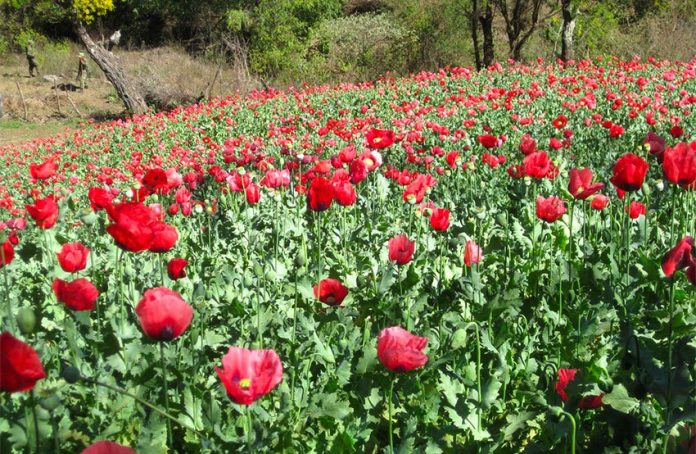Poppy cultivation and heroin production remain at record-high levels in Mexico, according to the United States government.
The Office of National Drug Control Policy (ONDCP) said in a statement yesterday that an annual U.S. government estimate found that the area of land dedicated to poppy cultivation decreased by 5% from 44,100 hectares in 2017 to 41,800 hectares last year.
But the size of the area was the second highest recorded this decade and 298% above the low of 10,500 hectares estimated in 2012.
The ONDCP said that the potential for pure heroin production declined by 4% from 111 tonnes in 2017 to 106 tonnes last year. They were the only years in the last decade in which heroin production estimates have exceeded 100 tonnes.
Production last year was 31% higher than in 2016 and 308% above the lowest level estimated this decade – 26 tonnes in both 2012 and 2013.
Mexico continues to be the primary supplier of heroin to the United States, the ONDCP said, explaining that 91% of heroin seized by the Drug Enforcement Administration (DEA) in 2017 was determined to have originated in Mexico.
Six Mexican criminal organizations – the Jalisco New Generation, Sinaloa, Juárez, Gulf, Los Zetas and Beltrán Leyva cartels – have the greatest drug trafficking impact on the United States, according to the DEA.
“Poppy cultivation and heroin production in Mexico continue to threaten the United States,” the ONDCP said.
In 2017, the Centers for Disease Control and Prevention reported that 47,600 Americans died from overdoses involving opioids and that 15,482 of those deaths involved heroin.
“President Donald J. Trump is focused on stopping the trafficking of heroin and other dangerous drugs coming from Mexico. He declared a national emergency on our southern border in part to ensure the safety of the American people from these deadly drugs,” the ONDCP said.
According to the Mexican government, cartels also ship fentanyl to the United States from 13 states.
The rising demand for the powerful synthetic opioid among U.S. drug users has been identified as the cause of plummeting opium gum prices in Mexico.
United States Secretary of State Mike Pompeo told senators Tuesday that during the migration tariff negotiations between U.S. and Mexican authorities last week there were also discussions about measures to stop the production and transit of illicit drugs.
“The joint declaration we signed was mostly focused on migration, but a good deal of the conversation was . . . about the traffickers’ desire to move whatever product will bring a market price that causes them to have an incentive to continue to do the things that disrupt so many lives here in the United States,” he said.
“We’ll try and take down these criminal enterprises between all of the elements of the U.S. government. We’ve donated equipment to the Mexican law enforcement, security forces; we’ve trained their officers to eradicate poppy and interdict drugs; we’ve provided them sniffing dogs. And yet, as you can see from the data today, many challenges remain.”
Source: Milenio (sp)
